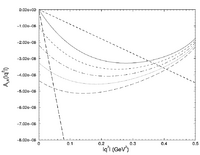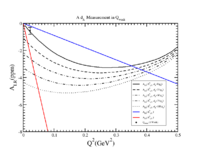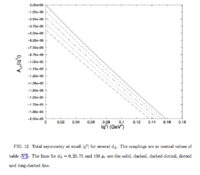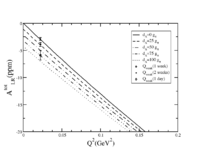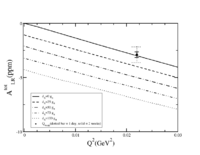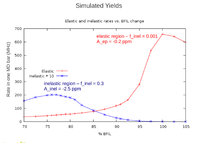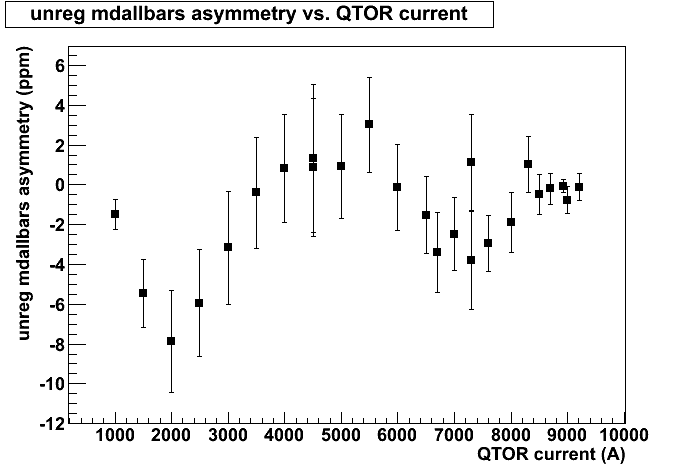Difference between revisions of "Qweak Delta"
| Line 196: | Line 196: | ||
Dave Mack's technical note on Qweak Background contributions and propogating their error. [[File:Qweak_Doc_965_v1.pdf]] | Dave Mack's technical note on Qweak Background contributions and propogating their error. [[File:Qweak_Doc_965_v1.pdf]] | ||
| + | |||
| + | ==Carbon== | ||
| + | |||
| + | |||
| + | Run 10678: Dilution tests: 0.5% Carbon, TS trig, QTOR=6700 (score: 18) | ||
| + | |||
| + | Run 10677: Dilution tests: 0.5% Carbon, TS trig, QTOR=8921 | ||
| + | |||
| + | ==Aluminum== | ||
| + | |||
| + | 10751-10769 | ||
| + | |||
| + | |||
| + | Run 10885: DS 4% AL Date: Fri, 18 Mar 2011 13:04:55 -0500 | ||
| + | |||
| + | Run 10821: DS Al 4% 30uA Date: Thu, 17 Mar 2011 08:39:43 -0500 | ||
| + | |||
| + | Run 10769: DS 4% Al production Date: Wed, 16 Mar 2011 07:29:58 -0500 | ||
| + | |||
| + | Run 10768: DS 4% Al production Date: Wed, 16 Mar 2011 06:21:17 -0500 | ||
| + | |||
| + | Run 10767: DS 4% Al production Date: Wed, 16 Mar 2011 05:50:22 -0500 | ||
| + | |||
| + | Run 10766: DS 4% Al production Date: Wed, 16 Mar 2011 04:47:55 -0500 | ||
| + | |||
| + | |||
| + | Run 10739: Parity 4% DS Al, 25uA, QTOR=8921 A, 3.5x3.5 mm, HWP= IN. Date: Tue, 15 Mar 2011 07:37:22 -0500 | ||
=Regression= | =Regression= | ||
Revision as of 04:35, 27 March 2011
Expected results
The above Figure in EPS format :File:D Delta Qweak Error.eps
File:A d-delta-vs-Q2.xmgrace.txt
The above Figure in EPS format :File:Atot d Delta Qweak Error.eps
File:Atot d-delta-vs-Q2.xmgrace.txt
Media:PCS_Report_4_LOI-03-105.pdf
Ratio of Elastic to Inelastic Region Rates = = 9.3:1 = Rate ratio for QTOR=100% / 75%
In the denominator 20 MHz = Inelastic rate and 50 MHz is the elastic rate; according to the simulation
Measured Elastic: Inelastic region ratio
| Qtor | Rate (MHz) |
| 9367 | 590 |
| 9144 | 633 |
| 8921 | 650 |
| 8698 | 528 |
| 8475 | 278 |
| 8252 | 163 |
| 8109 | 131 |
| 8029 | 121 |
| 7806 | 97 |
| 7583 | 84 |
| 7360 | 78 |
| 7226 | 76 |
| 7137 | 74 |
| 7048 | 74 |
| 6958 | 72 |
| 6869 | 69 |
| 6780 | 67 |
| 6691 | 64 |
| 6468 | 58 |
| 6245 | 52 |
Using the root command below
Mps_Tree->Draw("2*qwk_md3pos.hw_sum_raw/(qwk_bcm1.hw_sum+qwk_bcm2.hw_sum)","ErrorFlag==0")
I saw
Yield of MD3 Pos in Run 9905 = 1.644E4 MD counts/BPM counts
Yield of MD3 Pos in Run 9912 = 1.143E5 MD counts/BPM counts
Giving a ratio of 6.95
If I add both bar ends
Mps_Tree->Draw("2*(qwk_md3pos.hw_sum_raw+qwk_md3neg.hw_sum_raw)/(qwk_bcm1.hw_sum+qwk_bcm2.hw_sum)","ErrorFlag==0")
I saw
Yield of MD3 in Run 9905 = 4.179E4 MD counts/BPM counts
Yield of MD3 in Run 9912 = 3.239E5 MD counts/BPM counts
Giving a ratio of 7.75
using
Mps_Tree->Draw("qwk_mdallbars.hw_sum","ErrorFlag==0")
Yield of All Bars in Run 9905 = 0.027 MD counts/BPM counts
Yield of All Bars in Run 9912 = 0.0030 MD counts/BPM counts
ratio = 8.9
There seems to be some error in the comparison.
using the Hel tree
Hel_Tree->Draw("yield_qwk_mdallbars.hw_sum","ErrorFlag==0")
Shows same results as MPS tree mdallbars tree
Elastic Aluminum Asymetry
The Aluminum asymmetry was measured to be PPM
0.2 MHz/nA using warm gas target
Warm gas contribution about same size as downstream aluminum window.
To do aluminum measurement we can't use warm gas cell.
Aluminum window dilution 0.022+/- 0.002
Transverse Aluminum in Elastic
A sin wave with amplitude of about 4 PPM
You can weight the yields so the transverse asymmetry gets averaged over all octants.
File:Shi-Lin Zhu hep-ph-0107076 2001.pdf
first Inelastic Data
Asym -vs- QTOR
From Logbook entry https://qweak.jlab.org/elog/Analysis+%26+Simulation/254
The inelastic region of interest is expected to line up o the quartz bars when QTOR ~ 0.85 of its value for elastics.
In Feb 2011, QTOR(elastic) = 8921.
=> QTOR(Delta) = 0.85 \times 8921 = 7582
Run 9908
1 hour run with HWP OUT
https://hallcweb.jlab.org/hclog/1102_archive/110211010249.html https://hallcweb.jlab.org/hclog/1102_archive/110211020513.html
Run 9905
1 hour run with HWP IN
https://hallcweb.jlab.org/hclog/1102_archive/110210233842.html https://hallcweb.jlab.org/hclog/1102_archive/110211002416.html
Combining 2 hour of data taking
QTOR= 6700 Amps
I_{beam} = 145 \mu A
= Asymmetry averaged over all Main Detectors
If I assume only having 50 \mu A then I would need to take 6 hours of data to get the same statistic as above.
If I take a week of data at 50 \muA then that would correspond to 28 runs like the above.
So the uncertainty would be reduced by The measurement would have an uncertainty of 0.579/sqrt{28} = 0.1 PPM
background
Dave Mack's technical note on Qweak Background contributions and propogating their error. File:Qweak Doc 965 v1.pdf
Carbon
Run 10678: Dilution tests: 0.5% Carbon, TS trig, QTOR=6700 (score: 18)
Run 10677: Dilution tests: 0.5% Carbon, TS trig, QTOR=8921
Aluminum
10751-10769
Run 10885: DS 4% AL Date: Fri, 18 Mar 2011 13:04:55 -0500
Run 10821: DS Al 4% 30uA Date: Thu, 17 Mar 2011 08:39:43 -0500
Run 10769: DS 4% Al production Date: Wed, 16 Mar 2011 07:29:58 -0500
Run 10768: DS 4% Al production Date: Wed, 16 Mar 2011 06:21:17 -0500
Run 10767: DS 4% Al production Date: Wed, 16 Mar 2011 05:50:22 -0500
Run 10766: DS 4% Al production Date: Wed, 16 Mar 2011 04:47:55 -0500
Run 10739: Parity 4% DS Al, 25uA, QTOR=8921 A, 3.5x3.5 mm, HWP= IN. Date: Tue, 15 Mar 2011 07:37:22 -0500
Regression
https://qweak.jlab.org/wiki/index.php/Q-weak_Regression_Wiki_Page
Data Analysis
getting Qweak data from the Silo
jcache -g hallc /mss/hallc/qweak/rootfiles/pass0/*run number here*
looking for GOOD runs in database
There is a GUI interface on cdaql4 which can be run to look at run numbers and see their quality as recorded in the data base.
On cdaql4 run
./good_for_GUI
Root file format
The Qweak root files contain 2 trees ( MPS_Tree and EL_Tree). As the names suggest, the MPS tree contains data from devices for each Helicity bin. The HLS tree constructs helicity differences and asymmetries for each device in the data stream.
The devices listed in each tree above are folders which have sorted the data into 4 time windows within the helicity gate.
In the MPS_Tree there is a Bock0, Block1, Block2, Block3 which measures devices at 4 intervals within the helicity pulse, Block0 is first.
Several devices in the MPS_Tree are actually folders which contain branches that are raw readout, processed readout (value is converted to a unit via a calibration constant).
Drawing tree elements
Mps_Tree->Draw("qwk_bcm1.hw_sum","ErrorFlag==0")
If you get an error try
.ls
or try going up to the file subdirectory
if you pass the filename on the command line then the file is opened under the name file(0) so
_file0->cd()
should take you to the main subdirectory.
I think using the old TBrowser(0 screws up the pointers. "cd" to the file pointer when that happens.
